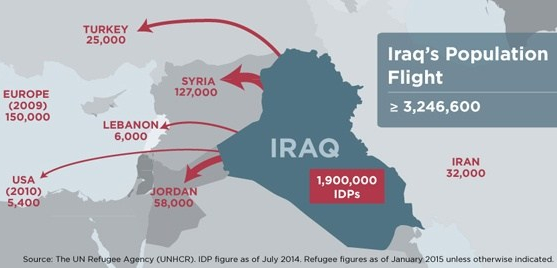I interviewed Ali to get a sense for the kind of life Iraqis experienced after US armed forces forcibly removed Saddam Hussein from power and installed the Coalition Provisional Government. The big moments of Ali’s early life offer a glimpse into the violence and uncertainty that defined Iraq during this period.
Ali’s story paints a picture behind the headlines on American news and the history of recent US involvement in the Middle East.
The US intervened in Iraq in 2003. The Bush administration had warned Americans that Saddam Hussein possessed and planned to use weapons of mass destruction. The invasion was called Operation Iraqi Freedom. After the invasion, US forces and independent inspectors failed to find WMD, and the rationale for invading Iraq shifted. Hussein, pro-war US officials now reasoned, was a ruthless dictator who endangered his people and deprived Iraqis of basic human rights. But in the wake of Hussein’s death and the end of his Baathist regime, Iraq seemed to spiral into even greater peril. Sectarian violence erupted as suppressed tribal and religious division in the country competed for power.
Many questions still linger in discussions of US adventurism in the Middle East. The war in Afghanistan, by and large, had broad support. Al Qaeda had operated in Afghanistan to launch the attacks of September 11th. But the invasion of Iraq met greater public skepticism. WMDs were unconfirmed. Our goals for Iraq, vague. Controlling the country’s vast oil reserves seemed to be the only plausible rationale, though no American official would admit this.
Did the US intervention help the Iraqi people? What kind of country did the US help to create by removing Saddam Hussein?

In 2007, the year Ali and his family escaped Iraq, 26,078 civilians would die. Between 112,017 – 122,438 civilian died from violence by March 2013. Other estimates put the number at 174,000 deaths. Researchers at Johns Hopkins put the total number of war-related deaths at 650,000.[1] Regardless, it is clear that the removal of Saddam Hussein increased sectarianism and, according to Ali, produced a political extremism fanned by a media system no longer under Iraqi government control.
Ali’s memories of nightly bombs and gunfire, the threats to his father’s life for having worked with the Americans, Ali’s time under a false name as a refugee in Syria and Jordan and his eventual move to America in 2008 are stories worthy of a biopic. America ultimately became a place of refuge for Ali and his family, despite occasional slurs, like the time someone asked Ali felt about his Uncle Bin Laden dying. Still, America provided Ali with a safer environment and educational options. But, as an American, I can’t help wondering what role “America” had in forcing the Muksed family to flee in the first place.
At times Ali’s story is harrowing; at others it is a powerful illustration of what it means to be displaced by violence and political conflict. Above all, Ali’s is an immigrant story. And one that ends happily, by and large. Though American foreign policy may have made Ali a refugee, America also gave Ali a place to grow and improve himself through higher education. But the details of Ali’s story also raise questions about the changes in Iraqi life brought about by the $2 Trillion dollar Operation Iraqi Freedom.
[1] https://www.npr.org/news/specials/tollofwar/tollofwarmain.html

